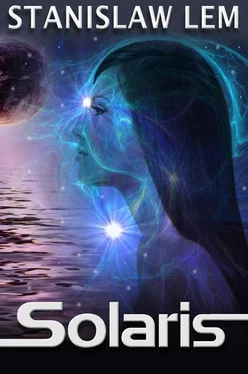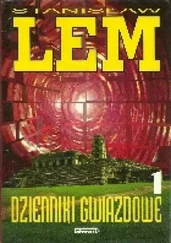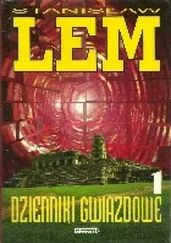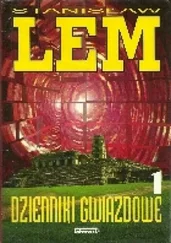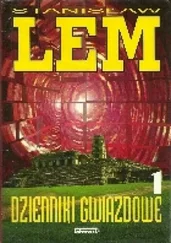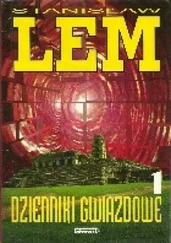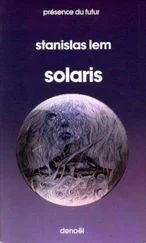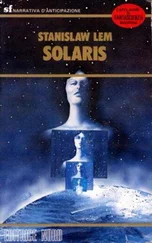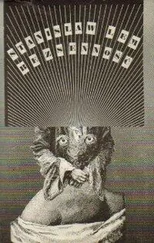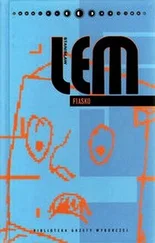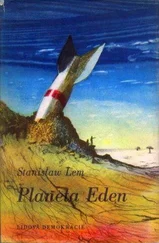The room was empty. In front of me there was only the gaping black of the bay window. The sensation lingered. The darkness was looking at me, amorphous, immense, eyeless, devoid of limits. The gloom outside was unbrightened by even a single star. I drew the lightproof drapes. I’d not even been a whole hour at the Station and I was already starting to understand why incidents of paranoia had occurred here. I connected it instinctively with Gibarian’s death. Knowing him, I’d thought till now that nothing could have disturbed his mind. I was no longer so sure.
I stood in the middle of the room next to the table. My breathing grew calmer. I could feel the sweat that had broken out on my forehead cooling. What had I been thinking about a moment ago? That’s right — automats. The fact that I’d not seen a single one in the corridor or in the cabins was very strange. Where had they all gone? The only one I’d encountered — at a distance — had belonged to the mechanized service at the docking bay. What about the others?
I glanced at my watch. It was just about time to go and see Snaut.
I left the cabin. The corridor was rather dimly lit by fluorescent lighting strips mounted on the ceiling. I passed two doors and came to the one that bore Gibarian’s name. For a long time I stood in front of it. The Station was filled with silence. I took hold of the door handle. The truth was, I really didn’t want to go in. The handle moved downwards, the door cracked open an inch or so, there was a gap that for a moment was black, then the light came on. Now I could be seen by anyone walking along the corridor. I quickly crossed the threshold and closed the door behind me, quietly and firmly. Then I turned around.
I stood with my back almost touching the door. The cabin was bigger than mine; it also had a panoramic window, which was three-fourths covered by a net curtain decorated with small blue and pink flowers that was clearly not a Station fitting but had been brought from Earth. The walls were lined with bookshelves and cabinets, both painted with a very pale green enamel that had a silvery sheen. Their contents had been tipped onto the floor in piles, and lay heaped among the upright chairs and armchairs. Right in front of me the way was barred by two tables on wheels that were tipped over and partially buried in mounds of journals that were spilling from damaged binders. Books with pages flapping open were drenched in fluids from broken flasks and bottles with fitted corks that mostly were made of such thick glass that simply being dropped on the floor, even from a considerable height, would not have been enough to smash them. By the window was an overturned desk with a broken adjustable lamp; a stool lay in front of it, two of its legs thrust among the half-open drawers. There was a veritable flood of papers, hand-written sheets, and other documents spilling across the entire floor. I recognized Gibarian’s handwriting and bent down. As I picked up loose sheets of notepaper I noticed that my arm was casting not one shadow as it had till now, but two.
I turned around. As if it had been set alight from the top, the pink curtain was burning with a vivid line of fierce blue fire that was widening with every moment. I tugged the fabric aside, and my eyes were struck by a terrifying blaze. It occupied a third of the horizon. A tangle of weirdly elongated shadows ran across the indentations of the waves toward the Station. It was the dawn. In the zone where the Station was located, after an hour-long night, the planet’s second, blue sun rose into the sky. The automatic switch turned off the ceiling lights as I went back to the scattered papers. I found a concise outline of an experiment that had been prepared three weeks before — Gibarian had planned to subject the plasma to extremely hard X-radiation. From the text I gathered the description was meant for Sartorius, who was to set up the experiment; what I had in my hand was a copy. The white sheets of paper were starting to dazzle me. The day that was beginning was different from the preceding one. Beneath the orange sky of the cooling sun the ocean, ink-black with bloody flecks, was almost always covered with a dirty pink mist that fused sky, clouds, and waves together. Now all this had disappeared. Even filtered by the pink fabric, the light glowed like the burner of a powerful halogen lamp. It made the suntan on my arms look almost gray. The whole room was transformed. Everything that had been red turned brown and faded to the color of liver, whereas the color of white, green, and yellow objects was so intensified they looked as if they were emitting their own glow. I squinted through the crack in the curtains. The sky was a white sea of fire, beneath which what looked like molten metal was twitching and trembling. I squeezed my eyes shut at the red circles that were filling my field of vision. On the shelf of the washbasin, the edge of which was cracked, I found a pair of sunglasses and put them on; they covered almost half of my face. The curtain covering the window was now flaring like a sodium flame. I went on reading, picking up sheets of paper from the floor and stacking them on the one small table still standing. Parts of the text were missing.
These were reports of experiments already conducted. From them I learned that the ocean had been subjected to radiation for four days, at a point located fourteen hundred miles northeast of the Station. All this shocked me, since the use of X-rays had been banned by a UN convention because of their lethal effect, and I was quite sure no one had sought permission on Earth for these studies. At a certain moment I raised my head and in the mirror of an open locker I caught sight of my own reflection, a deathly pale face in dark glasses. The room looked extraordinary, burning white and light blue. But a few minutes later there was an extended grinding noise and hermetic blinds came down outside the windows. The room darkened, then the artificial lighting came back on, now strangely wan. The place heated up, till at one point the steady hum from the air conditioning conduits turned into a strained whine. The cooling system of the Station was working at full blast. Despite this, the lifeless heat kept intensifying.
I heard footsteps. Someone was coming down the corridor. In a couple of soundless strides I was at the door. The steps slowed and stopped. Whoever it was, was standing outside the door. The handle moved slightly. Without thinking, I grabbed it from my side and held on. The pressure didn’t increase, but neither did it ease off. The person on the other side was being as silent as me, as if taken aback. For a good while we both held onto the handle. Then it jumped back up suddenly in my hand. It had been released, and a rustling sound let me know that the other person was walking away. I stood for a moment longer, listening intently, but nothing could be heard.
I hurriedly folded Gibarian’s notes in four and stuck them in my pocket. I went slowly up to the locker and looked inside. The overalls and other clothing were squashed into a corner, as if someone had been standing in there. The corner of an envelope was poking out from under a pile of papers on the floor. I picked it up. It was addressed to me. My heart suddenly in my throat, I ripped the envelope open and had to force myself to unfold the small sheet of paper that was inside.
In his even, tiny but legible handwriting Gibarian had noted:
Yearbook of Solaristics Volume I, Appendix, also: Minority report by Messenger re: F. Ravintzer’s Minor Apocrypha .
That was all, not one word more. The writing showed signs of haste. Was this some kind of important information? When had he written it? I realized I needed to get to the library as soon as possible. I knew the appendix to the first volume of the Yearbook of Solaristics ; that is to say, I knew of its existence, but I’d never had it in my hand, for it was of historical interest only. Ravintzer, on the other hand, and his Minor Apocrypha , I had never even heard of.
Читать дальше
